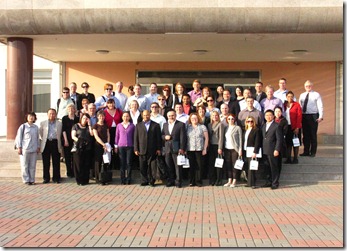The China trip is over, and we’re home tired but transformed. You can’t study and travel in China and feel otherwise. The world never looks as big nor China as overwhelming again.
China is an amazing country where you taste the pace of change and development – and it is both exhilarating and exhausting. Anything is possible; but the efforts required to navigate the culture, infrastructure, and realities of the country’s transition daunting. Recognizing all this at the core of one’s being is the purpose of the Executive MBA residency and the power of experiential learning. Translating that into executive judgment and rules for informed action comes with time and reflection. Students have been journaling to facilitate the process. I’ve been doing my own.
Below, my Top Ten list of what I hope students experienced in China. There are important learnings embedded in each for their careers, leadership effectiveness, and global citizenship.
1. If they were energized by the pace of action, the palpable excitement of our distinguished speakers (Chinese and ex-pats), and the sense of infinite (and prosperous) possibility, they learned something important about China today.
2. If they were exhausted by the pace of the action; the daily multi-layer challenges business and life require; the amount of information – sometimes conflicting – and planning needed to inform simple actions; and how plans changed, speakers cancelled, substitutes came, and traffic and government policies altered schedules despite high levels of planning, they learned something important about China today.
3. If they felt confused and awkward in knowing what rules (cultural, social, political, economic, ethical, governmental) applied when, they learned something important about China today.
4. If they were frustrated by a slow, erratic internet in a well-wired nation where cell phones work in subways, in deserts and on mountains, along the Great Wall, and in the highest of skyscrapers, they learned something important about China today.
5. If they were surprised that Shanghai could differ so markedly and in so many ways from Beijing and both cities from Tianjin and the country side (and how different a 5 star hotel in each could be), they learned something important about China today.
6. If they were surprised (or shocked) by differing industry standards, safety measures, pollution levels, and technologies, they learned something important about China today.
7. If they experienced the predilection for luxury brands and shopping as the national pastime among China’s rapidly rising affluent — and were intrigued by their own feelings of winning through their wiles in the shops and markets, they learned something important about China today.
8. If they saw a blind eye turned so as to turn a profit, they learned something important about China today.
9. If they heard every speaker – whatever their assigned topic – touch on the importance of talent development and new HR policies to attract, retrain, and train China’s young, eager, and mobile workforce, they learned something important about China today.
10. If they felt they learned a lot about China through this residency, but now feel how little they really know about this rising economic and political giant, they learned something important about China today, about the demands of global leadership, and about the role of lifelong learning for leadership effectiveness.
BONUS: The Bloch Executive MBA on a company visit to Lights Medical Manufacture Co., Ltd. in Tianjin pictured with the company’s founders, Dr. Li Shaobo and Ms. Wang Jinping, and senior leadership. (Photo compliments of Lights Medical.)
